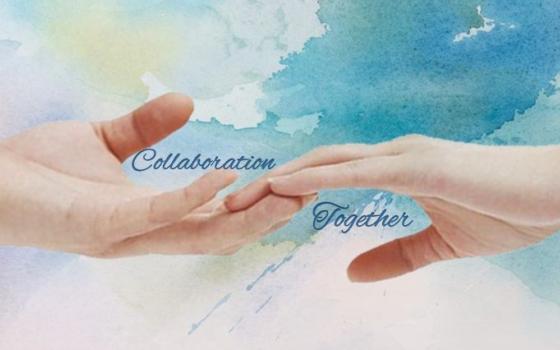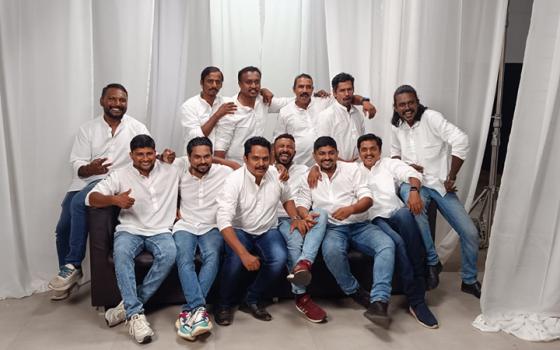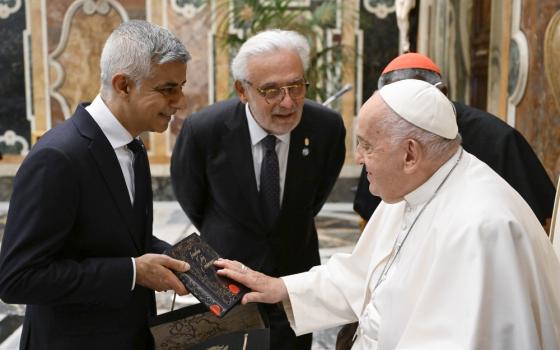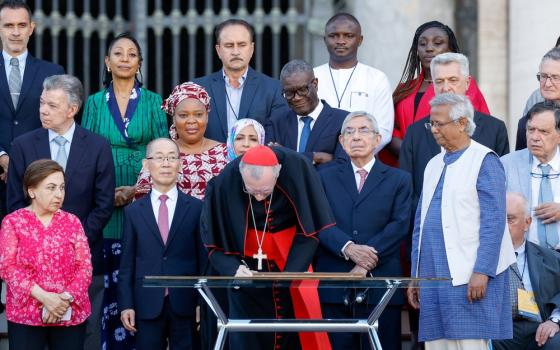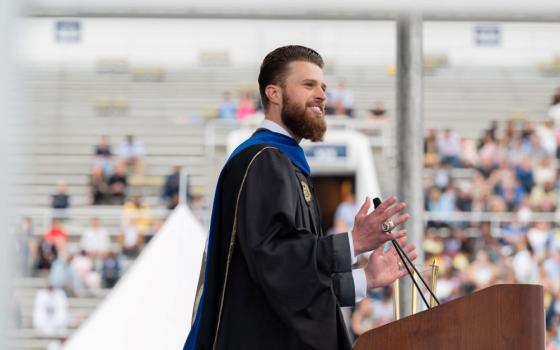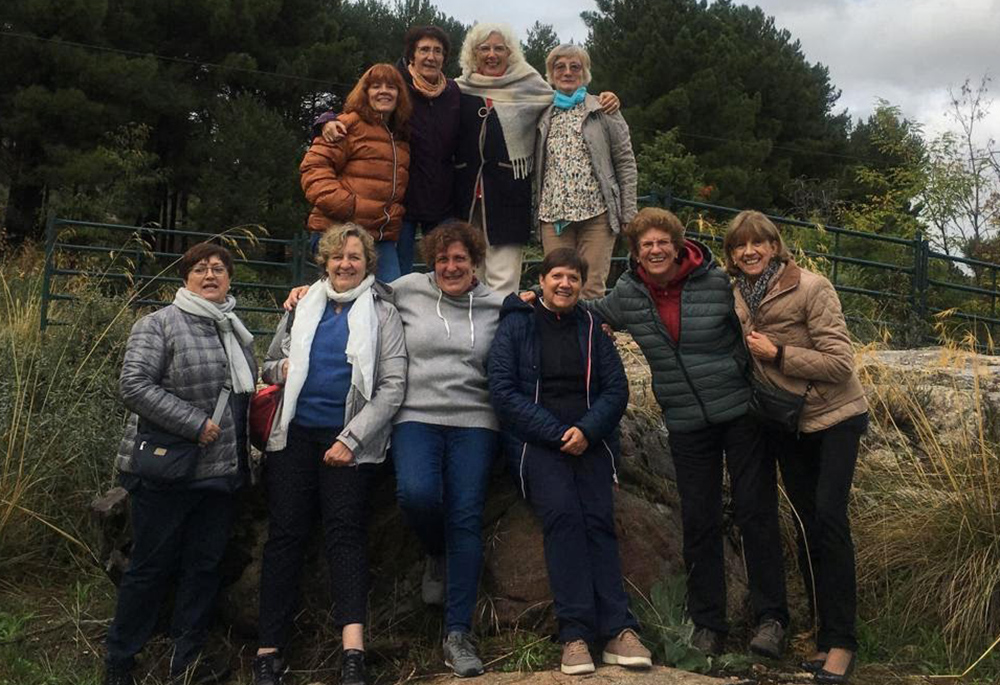
Magda Bennásar, second from the right, with members of the the Community of Magdala (Courtesy of Magda Bennásar)
Editor's note: Global Sisters Report, the dynamic online community that reports on and gives voice to Catholic women religious around the world, is celebrating its 10th anniversary this year. Join us as we take another look at stories and columns published in 2014 with new updates and reporting.
The year was 2019. I had arrived in Leuven, Belgium, to undertake a project: to be a part of the management and programming of the beguinage of Bruges, stepping in for the community of Benedictine Sisters who were in the process of leaving. Accompanied by another member of our community, I traveled to Leuven to study Dutch and update my theology, in close contact with the renowned Catholic University of Leuven. All of this was in anticipation of our involvement in the anticipated changes at the beguinage of Bruges. However, after months of waiting, studying and preparation, everything came to a halt because the Benedictines decided to remain.

The other piece of my story is that a few months earlier, through GSR, of which I was and continue to be a regular reader, I had come across a column, "Life consecrated, not religious" by Margaret Gonsalves, and when I read it, I knew it came from the Spirit. At the time, I was in a city where the conservative bishop staunchly opposed any possible progress or advancement in our life and ministry. As consecrated feminist women offering ecospirituality programs, he felt that we were escaping his traditional methods and the strict control he exercised over religious women. He disapproved of anything that deviated from his vision, making his objections clear.
I was also in the process of leaving a community that, to me, had lost its essence, like a fine wine gone sour.
I realized that the column I read in GSR pointed towards a way of life where nothing and no one, driven by their ego-biased authority, could restrict, dictate or govern my unique life and enthusiasm for a consecrated life aligned with reality. That is why the lifestyle of the Beguines resonated with me so deeply and continues to inspire me today.
It was through GSR and its columnists that I discovered an alternative path, for which I am deeply grateful. This discovery was the driving force behind a significant decision: to initiate a process of getting to know the new community that, according to some sociologists, embodies the spirit of the Beguines today. This community is known as Sisters For Christian Community, or SFCC.
From Leuven, I had the opportunity to travel frequently to Holland, where a group of Sisters for Christian Community lived. This marked a personal turning point, characterized by hope following a huge disappointment with my previous community and the dark tunnel that the ultra-conservative bishop put us in.
With a sense of renewal in the air, it became a time of sabbath. During this time, a community of lay men and women formed, gaining strength and structure propelled by our newfound vitality. This community, known as the Community of Magdala, endures to this day.
I've always had a passion for writing. I shared these stories through our blog and contributed to various newspapers and digital magazines, all in Spanish.
Amid these experiences, two of my sisters encouraged me to participate in The Life, a monthly panel published by GSR where a group of sisters respond to questions about spirituality, religious life and other topics. Naturally, this was all conducted in English, which is my third or fourth language if you count the many years I spent studying French.
Despite knowing that I might not meet the standard, I didn't want to disappoint Carmen and Teresa. So, I wrote the reflection following the detailed format outlined by American guidelines. This made me feel insecure because cultural differences can affect interpretation, but something within me urged me to give it a try.
Months passed without receiving any response, until one day, by chance, I decided to check the spam folder on my computer. There, I found a note from Michele Morek informing me that the deadline for confirming my participation in The Life panel was approaching. To my surprise, the note had been sitting in the spam folder for weeks.
Advertisement
And thus began my journey with GSR. Like an international orchestra conductor, Michele orchestrated our interactions with the most diverse sounds, colors and cultures. She accompanied us, accompanied me, with the wisdom of experience and the authority of a teacher. Her nuances and suggestions were always delicately empowering: "Maintain your style, just clarify this sentence," or "complete this story ... correct this expression because in English, it doesn't carry the same meaning as in Spanish." Her warmth and sense of humor fostered a relationship that, despite never meeting in person, made the process of writing and receiving corrections a joyful and enriching experience. Similarly, Helga now fills this role, reaching out for calls or video conferences, and due to different time zones, you can be talking to her in your pajamas while she tries to convince you to write this or that, and then suggesting you make a video or asking if I'd like to translate. And she opens doors, paths and friendships to you, all while correcting you to the end over the most infuriating comma.
That's GSR — demanding yet fun, empowering and profoundly human. It is made possible by individuals who are both approachable and open, allowing us to share some of the most captivating stories I have read in recent times. These stories range from accounts of persecution in Nicaragua, to the harrowing realities faced in Haiti and Bethlehem. They delve into the courageous and dangerous work of the sisters in Ukraine, who bravely venture into the most remote and war-torn regions, risking their lives to serve those affected by the cruel war that has ravaged the border between Russia and Europe for more than two years. There are also stories of sisters providing refuge to weary migrants in border areas; as well as stories of consecrated women and monastic sisters traversing our towns and cities, each with their own unique perspective and experiences. Even from their cloisters, these sisters manage to "connect with life" and share their insights with us. [Readers can use GSR's translate button as needed, located at the top-right of screens.]
Amid the many turbulences caused by the feeling that I needed to evolve my way of living my discipleship and vows, GSR provided and continues to provide me with a living space where I can reflect and draw inspiration from the wisdom of numerous sisters who write from a multitude of diverse realities.
GSR provided and continues to provide me with a living space where I can reflect and draw inspiration from the wisdom of numerous sisters who write from a multitude of diverse realities.
One day, feeling that I "had to say it" because I had been seeing it very clearly within me for some time — I suggested in one of my columns in English the importance of considering the creation of a Spanish version of GSR. With supporting figures and arguments, I emphasized that Spanish is the second most spoken language in the world, with approximately 500 million speakers, behind Mandarin Chinese. Furthermore, I noted that the sisters who speak Spanish are likely the most numerous and youngest demographic in the U.S. and Europe. Additionally, I highlighted how sisters from Latin America contribute a sense of joviality and joy to the community.
And then, like passing the torch in the Olympics, someone stepped up. Gail DeGeorge, the editor of GSR, voiced her agreement with the idea and expressed that she knew of other sisters who would support it. She, like many of us, felt the calling to share this hidden treasure in other languages.
Shortly thereafter I received an invitation from Gail to be part of a small international team tasked with making decisions for the future Spanish version of GSR.
Today, it's a reality. The new bilingual editor, Benedictine Sr. Helga Leija, has taken over from Michele Morek following Michele's official retirement. However, I am aware and pleased to know that Michele continues to play a role "behind the scenes."
Helga brings vitality and bilingualism to the role, demonstrating effort and dedication in her work. She fosters direct communication with each sister, offering a platform for building community among the columnists through a chat group. This chat group enables us to connect with one another and provides encouragement to collaborate effectively.
GSR drives us to evolve, especially at a time when we are realizing that strength lies in interconnectedness, mirroring the intricate networks found in nature. While these networks have always existed, science now brings their clarity and necessity to our attention.
Happy 10th Anniversary to GSR and the entire team behind this remarkable project!

